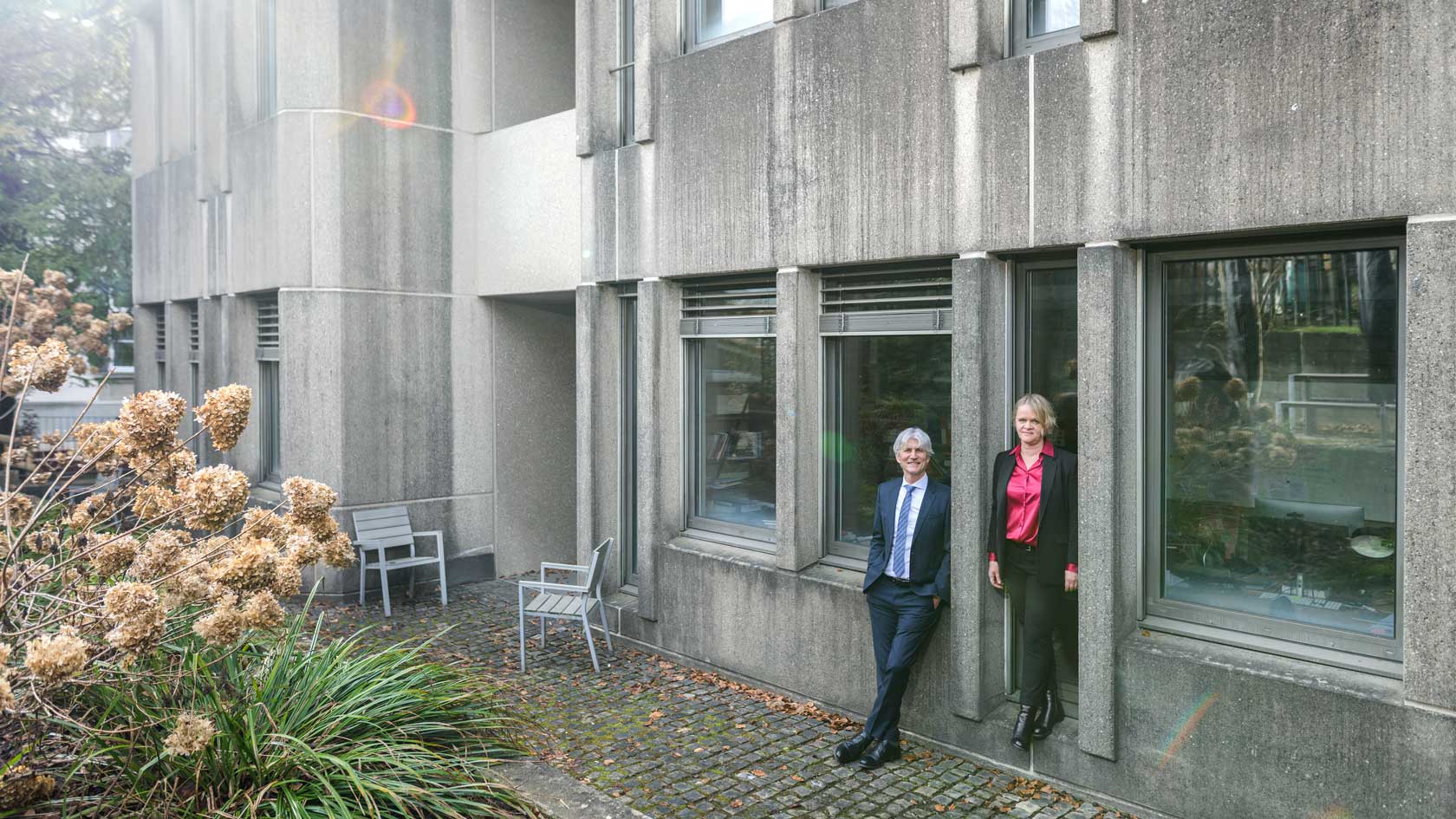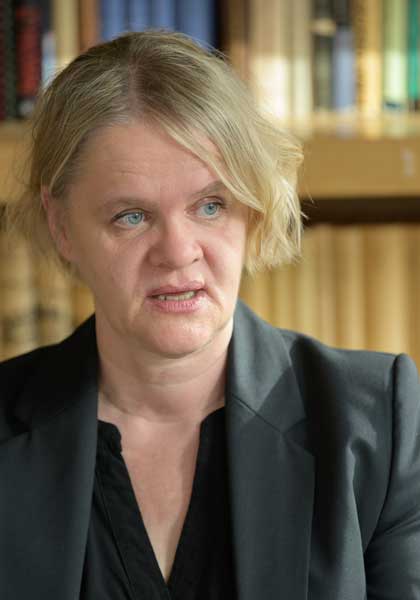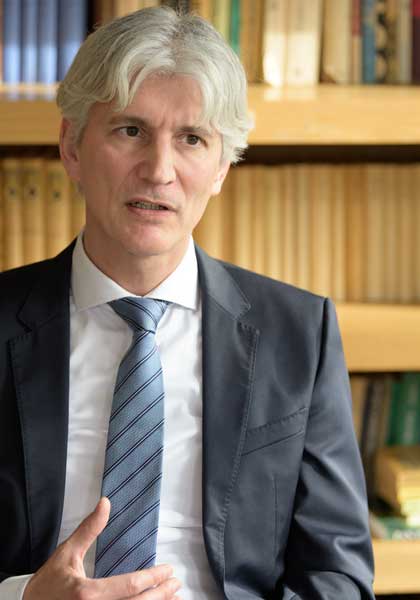Navigation auf uzh.ch
Navigation auf uzh.ch

Sylvia Sasse, Jeronim Perović, you’re establishing an Institute for Eastern European Studies at UZH. What actually belongs to Eastern Europe in geographic, political and cultural terms?
Sylvia Sasse: That’s still the subject of debate. Thirty years ago, the US historian Larry Wolff published the book Inventing Eastern Europe. In it he argues that Eastern Europe isn’t just a region, but a concept that was used in Western Europe at the end of the 18th century to degrade the population to the east as being uncivilized and unenlightened. Like the Orient before it, Eastern Europe was conceived as the Other of the West. This went hand in hand with a negative appraisal of the Slavs as a people, a form of anti-Slavism. In other words, it’s simultaneously about geographical, political and cultural concepts, and the way people describe others and themselves.
Jeronim Perović: Precisely what researchers understand by Eastern Europe is ultimately the product of historical developments. If we were to start researching Eastern Europe today, we would probably define the region differently. The first chair of Eastern European History at UZH was established in 1971 with Carsten Goerke as its professor. That was in the middle of the Cold War when the “Iron Curtain” clearly demarcated East and West. Now this is no longer so clear. Not only that, but as well as being a very large area, Eastern Europe is also very heterogeneous, both culturally and politically. That’s something that has to be engaged with. We want the new Institute for Eastern European Studies at UZH to provide the necessary expertise to do so.
Sasse: In this context, it hasn’t been easy for us to decide what we want to call our future institute, because we research and teach on East Central, Eastern and Southeastern Europe as well as the former Soviet republics in the Caucasus and Central Asia. Russia alone extends geographically all the way to Asia. This area can’t just be defined geographically; it was the product of imperial conquests and colonial strategies.
The war in Ukraine is a result of Putin’s imperial and colonial thinking. How has the war changed the political, social and cultural dynamics in Eastern Europe?
Perović: I see parallels with the wars of secession in the former Yugoslavia in the 1990s. Initially, Slovenia and Croatia wanted to become independent, but Serbia used violent means to try and create a cohesive common state under Serbian domination. Basically, Ukraine’s struggle to defend itself is a belated war of secession. Ukraine knows that to survive as an independent nation it has to separate itself from Russia. Russia, on the other hand, sees Ukraine as an inseparable part of a “Russian world” that has grown historically.

The protests and the revolution in Ukraine and Belarus are an absolute threat to Putin’s ideology of a Russian world.
Sasse: In Ukraine, however, it’s not just a matter of national or cultural demarcation, but of political demarcation. The people in Ukraine don’t want to live in an autocracy and they don’t want to be dominated by the ideology of the “Russian world” advocated by Putin. The revolutions in Eastern Europe, the suppressed revolution in Belarus and the one in Ukraine, were always revolutions for democracy, for a constitutional state, and for joining Europe. Putin always refers to these revolutions as a coup d’etat or putsch by the West; this is also one of the reasons why he started this war in 2014. The protests in Belarus and the revolution in Ukraine are an absolute threat to Putin’s autocracy and his ideology of a “Russian world.”
Putin is trying to use the war in Ukraine to make up for some of Russia’s loss of power after the collapse of the Soviet Union by subjugating Ukraine and bringing it back into Russia’s sphere of influence. Hasn’t he achieved the opposite?
Sasse: Yes, he has. The war has destroyed the multifaceted relations between Ukraine and Russia. It’s primarily Russian-speaking Ukrainians who are being killed in Putin’s war; in other words, it’s mainly those who were supposed to be “saved” who are dying. Many Russian-speaking Ukrainians have since switched languages and now speak Ukrainian. This shows above all that Putin isn’t interested in these people. He’s interested in maintaining his power.
Perović: Evidence of this is that both languages, Ukrainian and Russian, were often spoken in the same family without this being perceived as a problem. I’m currently watching the series Servant of the People, in which Volodymyr Zelenskyy plays the Ukrainian president. Zelenskyy speaks Russian throughout, even though the series was recorded after the annexation of Crimea in 2014 and the war in Donbas. This only changed fundamentally with the massive Russian war of aggression from 2022 onward. Now Zelenskyy consistently speaks Ukrainian and many Ukrainians who previously spoke Russian do the same. Language has become a marker of demarcation. The Russian language represents war and Kremlin propaganda, and Ukraine is fighting back against this.
Propaganda plays an important role in war. Sylvia Sasse, you mainly analyze Russian state propaganda. What messages does it convey?
Sasse: What characterizes this disinformation and propaganda is that Russia’s not only waging a war of information but also a cultural war, directed not just against Ukraine but against the so-called collective West. Propaganda usually proceeds according to the principle of inversion. I’ve written a book on the subject. In other words, it consistently accuses the West of doing what in actual fact is happening in Russia: waging a war of aggression, establishing a dictatorship, failing to protect freedom of opinion, and being morally corrupt. Russia’s attack on Ukraine is thus strategically reinterpreted as resistance against the West, as defense, and even as decolonization. This also includes the abstruse claim that Ukraine is being “de-Nazified,” which is upheld to this day. The aim is to denigrate the whole of Western culture. Russia is also interfering in the politics of Western countries, for example through the targeted, locally tailored foreign propaganda from RT (formerly Russia Today).
What arguments are being propagated?
Sasse: It’s all about deliberately dividing democracies, for example with disinformation about climate policy, migration and gender issues. Many political forces are gratefully adopting these narratives and using them for their own purposes. Western media are also portrayed on RT as state media, with RT styling itself as a “second opinion,” an alternative medium of truth. Also typical are campaigns aimed at denigrating Ukrainians in Germany as welfare recipients who are taking money away from other welfare recipients. The propaganda in Germany is geared to right-wing parties such as the AfD or to parties such as Die Linke, which are catered to with anti-American narratives.
Perović: While Russian propaganda initially tried to justify the war on Ukraine as a “military operation” against alleged Nazis and the fascist regime in Kyiv that was oppressing the population, the main emphasis now is on the defensive struggle against the “collective West.” In the official Russian interpretation, the West is accused of using Ukraine as a tool to weaken or even destroy Russia. The only thing is, because the West is actually providing Ukraine with large-scale military support, the Russian propaganda now actually seems quite plausible to many in Russia. The Kremlin is using the idea that Russia is in an existential struggle to appeal to people’s patriotic feelings, and this seems to be working. This doesn’t bode well for the further course of the war, as it’s unlikely that Russia will let go of Ukraine. If Putin succeeds in annexing even only the 20 percent or so of Ukrainian territory already occupied by Russia, he can claim this as a victory because he has managed to defy the entire “collective West.”
For a long time, the West relied on peaceful coexistence with Russia; Germany’s Ostpolitik in particular was shaped by the mantra “change through trade.” With the war in Ukraine, Russia has brought this chapter to an end, perhaps even destroying an illusion. Why has Russia turned away from the West?
Perović: The idea on which Chancellor Willy Brandt’s policy of détente was based from the late 1960s onward was “change through rapprochement.” At the time it was justified. The Cold War held sway and the various zones of influence and borders were undisputed. The two Germanys recognized each other de facto, even if not under international law. The hope was that the expansion of trade would have positive effects not only on the economy but also on political relations and stability. What began 50 years ago should have been questioned at the latest after the annexation of Crimea in 2014. But the German government politically supported the project launched in 2015 to build an additional gas pipeline from Russia, Nord Stream 2. Whatever my sympathy for Angela Merkel’s policy, in my view this was a major lapse.
So Germany should have put down a different marker?
Perović: Germany shouldn’t have made itself even more energy-dependent on Russian gas after it became clear that Russia was moving in such a problematic direction. I don’t understand why politicians didn’t react to this.
Sasse: Overall, Europe failed to send the right signal in 2014. It was wrong to allow Putin to annex Crimea and create this hotbed of war in eastern Ukraine. One would have hoped for a much clearer rejection of Russia. Overall, as Zelenskyy rightly repeats, we’re faced with the question of the extent to which democratic countries want to make themselves dependent on autocracies, terrorist regimes and a mafia-like organized economy.

If Europe manages to support Ukraine for as long as necessary, then we’ll also be on the right track in the future.
Perović: Agreed, but at the same time Europe and the West as a whole should have made a much greater effort to resolve the Ukraine crisis. They did sit down at the table a few times to implement the Minsk peace agreements. But there was no really serious attempt to find a good and lasting solution; the issue wasn’t given very high priority on the European side. At the time there would have been some scope for solutions. But the opportunity was missed because people didn’t want to admit how dangerous the situation was.
Hasn’t Putin also changed a lot? Initially he cooperated with the West. Now he stylizes it as his arch-enemy. What happened there?
Perović: Wars have their own dynamic. Putin’s aim wasn’t to disrupt relations with the West but to force a regime change in Kyiv in a military blitz to bring Ukraine back into Russia’s sphere of influence. After all, Ukraine occupies a key place in Putin’s vision of a major power. The more allies Russia can bind to itself, the stronger Russia’s position will be in the new multipolar world order that Moscow is striving for. For years, Moscow had been trying by any means necessary to prevent Ukraine, the second most important republic in the former Soviet Union after Russia, from moving further and further away from Russia. When economic and political pressure wasn’t enough, they tried military means. If they had actually succeeded in bringing Ukraine rapidly under control, there would probably have been an outcry in the West and more sanctions, but relations would have quickly returned to normal. Things turned out differently. Russia is now waging a territorial war of conquest that could last for years to come. Putin sees himself as being on a historic mission and is hazarding the lasting disruption of relations with the West.
Sasse: It’s important not just to look at foreign policy. In terms of domestic policy, it’s been clear for a long time how state repression and arbitrariness have been gradually stepped up since around 2008. The political scientist Robert Horvath wrote about a preventive counter-revolution as early as 2013. And Putin’s cultural war is primarily directed against his own population. In cahoots with the Russian Orthodox Church, he’s presenting homosexuality, queerness, feminism and wokeness, rather than his own wars, as the real threat to humanity. Critical art or the showing of Ukrainian art and films is prevented, for example by staging bomb threats to prevent film screenings. As early as 2012, foreign agent laws were introduced framing criticism of politics as Russophobia, making the work of NGOs, the media and private individuals massively more difficult or impossible; and now, as in Belarus, there are also lists of extremists again, including artists as well as opposition politicians. We’ve conducted various research projects on this increasing repression, including work on three art-related major show trials in the 2010s, which reveal the abuse of the judiciary for censorship.
So Russia has been brought into line culturally?
Sasse: On the one hand, new laws have been introduced in an attempt to ban criticism of the church by prohibiting artists from using religious symbols. This is consistently interpreted as “stirring up religious hatred.” Since 2022, criticism of the war has been interpreted as discrediting the Russian army and the authorities involved, sometimes leading to long prison sentences. The judicial system is completely corrupt and politically controlled. Despite this, there are always courageous artists and citizens making small gestures to show that they won’t allow themselves to be corrupted. The media, in particular, are toeing the line and spreading the ideology of the “Russian world” to the masses. From what I’ve observed, the extent and aggressiveness of the propaganda far exceed the propaganda during the Soviet Union.
Perović: I think it’s not just propaganda that makes it possible for state narratives to be accepted, but certain social sensitivities as well.
What goes down well with the population?
Perović: For example, the idea that Russia needs unity to develop successfully. The course of this development is set by the state, just as it was back in the days when the communist party saw itself as the guiding force of society. From this perspective, any criticism, no matter how small, is potentially harmful. Destroying opposition is allowed. This idea is deeply rooted in society, which is why what’s happening in Russia today is possible.
How will the war in Ukraine end?
Sasse: I have a utopian vision: it will end with Ukraine getting its territories back – with the support of those countries that are committed to democracy in Ukraine. And I hope that however unlikely this may be, the Russian people will fight back against the criminal regime.
That really does sound utopian.
Sasse: Of course it’s utopian. But it’s important to realize that this future utopia won’t simply happen; it’s also up to us to bring it about. If we want to retain our own sovereignty, there’s no way around continuing to support Ukraine.
Perović: The question is, what happens if Ukraine loses? That would give Putin an incredible boost. He would feel empowered and might set his sights on more targets for conquest. A Russian victory would possibly make Russia even more attractive to right-wing populist groups, especially in Europe. This is a test for Europe. So it’ll be crucial whether solidarity with Ukraine is maintained. If Europe – I’ll leave the US out of it, because this is something we should really be able to do ourselves – manages to support Ukraine for as long as necessary, then we’ll also be on the right track in the future. If we don’t manage that, I see major problems ahead for Europe.
It’s up to the Russian people to free themselves from this regime.
Is a return to peaceful, constructive cooperation with Russia conceivable? And if so, under what conditions?
Sasse: I don’t think that will happen with Putin. He’s now got himself into a situation from which I believe there’s no way back. It would only be possible with a radical change of power in Russia. And that would have to affect so many layers of the political system, the secret services and the economic system, which benefits immensely from this government, that it’s almost inconceivable. It’s up to the Russian people to free themselves from this regime.
Perović: What I’m a bit afraid of is a ceasefire before Ukraine has recaptured the lost territories or at least large parts of them. Because then Putin could portray himself as the one who wants to cooperate again, as the “good guy” so to speak. My fear is that many in Europe would use the ceasefire as an excuse to plead for a return to normality. So a ceasefire at this point would be problematic. That’s the dilemma in this story. On the one hand, we want peace for the country and its people. On the other hand, if that were to happen now it would play into Putin’s hands, and he would have won.
This article is from the current UZH Magazin «Gesunde Frauen und Männer»